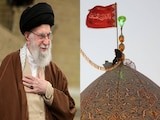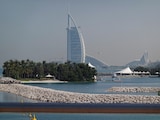- Mohammed Shahabuddins portrait was ordered removed from all Bangladeshi foreign missions abroad
- The interim government scrapped August 15 as National Mourning Day commemorating Sheikh Mujibur Rahman
- Around 65 missions had removed Shahabuddins portrait after the August 2024 student uprising
The Mohammad Yunus-led interim government in Bangladesh is leaving no stone unturned in wiping former Prime Minister Sheikh Hasina's legacy from the South Asian nation. In its latest diktat, Dhaka has ordered the removal of Hasina-appointed President Mohammed Shahabuddin's portrait from all foreign missions abroad.
The order came after the Yunus regime scrapped the status of August 15 as the 'National Mourning Day', as it continued to suppress the activities of the Awami League. Hasina's father, Sheikh Mujibur Rahman, who is considered 'Father of the Nation' in Bangladesh, was brutally assassinated on August 15, 1975, along with several of his family members.
Removal Of The President's Portrait
The directive to remove President Shahabuddin's portrait was given to several missions over the telephone from the foreign ministry, according to a report by The Bangladeshi Daily Prothom Alo.
The report said, some designated Bangladeshi diplomats stationed abroad were also instructed from Dhaka to inform others to remove portraits from other missions and sub-missions.
After the fall of Hasina's government in August 2024, her portraits were removed from all Bangladeshi missions across the world as part of protocol. But as Shahabuddin remained the President even after she fled the nation, his portrait remained in several of the missions.
The report said that around 65 missions, including those in India, the United States and the United Kingdom, had already removed the portrait following the student uprising of 5 August last year. The remaining were asked to take it down now.
"National Mourning Day Violence"
Hasina's son Sajeeb Wazed has accused the Muhammad Yunus-led interim government of unleashing violence across the country and "criminalising grief" after murals depicting the sacrifices of the 1971 Liberation War were vandalised, prayers were disrupted, and several citizens were arrested for mourning on the death anniversary of Bangabandhu Sheikh Mujibur Rahman on August 15.
Wazed, Former Information and Communication Technology (ICT) Advisor to the Prime Minister of Bangladesh, said that on the eve of August 15, Yunus's press secretary openly threatened citizens against organising mourning events.
However, when people defied the warning, he alleged that Yunus-backed police forces "struck with fury," and overnight, teachers, imams, professionals, and community leaders were thrown behind bars. Wazed claimed the innocence of the people jailed and said that "their only crime was loyalty to memory and truth."
Wazed asserted that under the "iron grip" of Yunus, ordinary people, including teachers, students, religious scholars, women, and even rickshaw pullers, have been reduced to "helpless victims, crushed under the weight of his vengeance."
What was once a day of unity and mourning, he said, has now been turned into a "battlefield of fear."
"Across Bangladesh, grief has been criminalised. On August 15, the day that marks the assassination of the nation's founding father, citizens who dared to remember their liberator found themselves hunted, silenced, and dragged into darkness," Wazed posted on X.
Wiping Hasina's Legacy?
One year since Hasina's dramatic fall from power in Bangladesh on August 5, the country has changed in more ways than one imagined. The nation is now being run by an unelected interim administration, which has said that the next elections will be held in early 2026.
Religious hardliner parties like Jamaat-e-Islami, which were once banned, have gained ground in the country, with a dramatic rise in crime against minorities. Nobel laureate Muhammad Yunus's government has disposed Prime Minister's Awami League party, and several leaders of the party have been subjected to targeted violence.
'Ganabhaban', Hasina's once-tightly-guarded official residence, is now being turned into a public museum. Per the Yunus regime, the goal of the move is to keep Bangladeshis reminded of what officials describe as "years of unchecked power and authoritarian rule".















